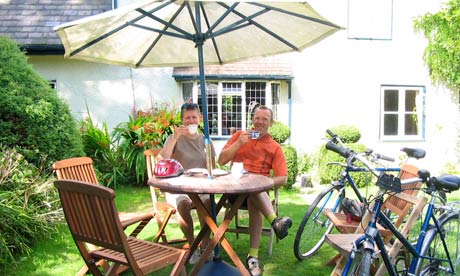
"When you hear click-click-click-click … br-br-br-br-brr …, that last bit is the insect being eaten," said Chris as he showed us how to use our bat detector.
Now I don't know about you but, despite a keen interest in nature, I still look away from the television as soon as it becomes apparent that some creature is about to become apprised of its precise position in the food chain. Thus, the prospect of eavesdropping on a daddy-long-legs's last moments didn't entirely fill me with joy. However, I was on Britain's first and only cycling and canoeing wildlife safari, so I was had to bury my squeamishness and get in touch with my inner Attenborough.
And there's something about the Shropshire/Herefordshire border that would win over even the most fervent devotee of concrete, steel and urban grit. Before the holiday had even officially begun, my friend and I found ourselves cycling a gauntlet of billowing waves of cow parsley flecked with pink star-bursts of red campion. When we pedalled into Petchfield Farm – the starting point of our trip, just a few miles west of Ludlow – we had already left our metropolitan sensibilities firmly behind us.
As an introduction to the safari, Kay and Chris Dartnell of Wheely Wonderful Cycling handed us a lovingly compiled info pack and talked us through possible self-guided cycle routes – from a child-friendly 11 miles a day to a still-gentle 20 – on maps whose roads Chris had colour-coded to show precisely the amount of pedal power needed to negotiate them. Last of all came a demo of the bat detector. "Use it as you would a police speed gun," Chris advised us.
Safari-goers would normally be fixed up with bikes here too, but since we were using our own all that was left to do was for us to hand over our panniers – to be taken ahead to our accommodation – and set off unencumbered into the wilds.
Lovely somnolent Herefordshire – a county that somehow seems to have kept one foot firmly in the Middle Ages – must rank among England's most unsung counties. Once we had left, we passed between fields trimmed with golden gorse and rode through hamlets so very ancient and peaceful that had a dairymaid emerged from one of their black-and-white houses carrying a pair of churns on a yoke we wouldn't have been a bit surprised.
Cruising backroads on which we were the only traffic, we entered Sned Wood, a haven for butterflies. We slowed our pace and were seduced by the dappled charms of chocolate-coloured speckled woods and brilliantly camouflaged brimstones, flitting about like tiny yellow leaves that had taken flight. Overhead, hovering buzzards were replaced by whirling red kites as we pushed further west and briefly into Wales.
But it was our accommodation for the two nights that really gave us free rein to play the travelling zoologist. The Buzzards, a 17th-century farmhouse in a 16-acre biodynamic smallholding on the edge of the hamlet of Kingsland, is not only home to a clutch of farm animals but boasts its own sylvan badger hide.
Our cottage was once the end of an ancient hay barn and we set off on foot from its front door just before dusk, pausing to scratch the ears of a heavily pregnant Tamworth sow, and made our way up through bluebells to the hide. There it was that we learnt one of nature's lessons: she won't always play ball. In this case, the badgers broke from their usual crepuscular habit and stayed firmly in their sett.
Happily, our disappointment was short-lived. Within minutes our bat detector was giving off all manner of ticks, clicks, smacks, slaps and warbles as pipistrelles, greater horseshoes, and long-eared bats filled the canopy of trees above us, expertly gobbling up insects by the sackful.
Back in our cottage, Elaine – one of those wonderful hosts for whom nothing is too much trouble – plied us with local ciders and beers that helped wipe away the last vestiges of regret we felt regarding the badgers. And we knew the best part of our adventure for softies was yet to come.
It is simply impossible to paddle a two-man Canadian canoe without hearing the Hawaii Five-O theme inside your head, especially when you're elegantly lurching over gentle rapids. After a few simple dos and don'ts we were launched downstream into a mist that turned the Wye – a secretive soul at the best of times – into a place of ethereal mystery. Here we preferred to drift. Yellow wagtails flitted past us, oystercatchers skimmed the water on either side and then, almost before we knew it, we found ourselves in a storm cloud of toffee-and-cream-coloured sand martins.
Rare are the days on which one experiences something completely new, yet I can safely say I have never before been so close to so many birds as when those scores of martins slipped and sliced and scythed their way through the air around us for minutes on end. Miles later, as we were pulling up at Hay, we were still saying, "Wow!", just a little awestruck.
• Wheely Wonderful Cycling (01568 770755, wheelywonderfulcycling.co.uk) offers a three-day, two-night wildlife cycling and canoeing safari for £205 (adult) or £145 (child), including B&B accommodation, luggage transportation and all equipment hire. First Great Western (firstgreatwestern.co.uk) has returns from London to Newport from £22, and returns from Newport to Ludlow with Arriva Trains (arrivatrainswales.co.uk) are from £25.70
Dixe Wills is the author of Tiny Campsites (Punk, £10.95)

